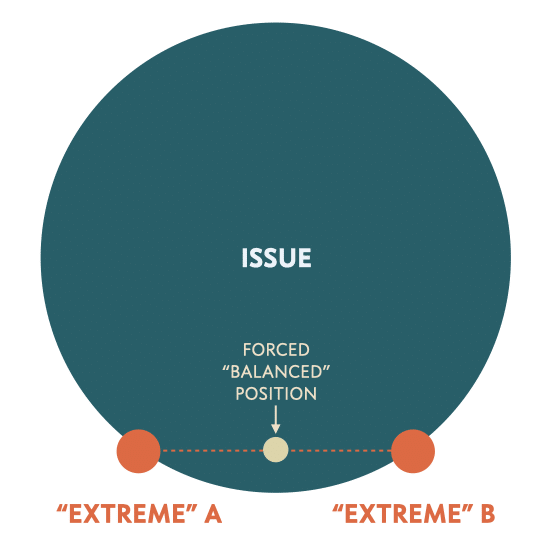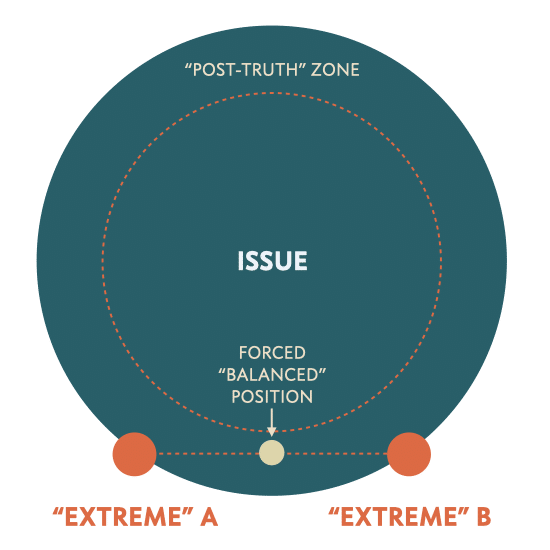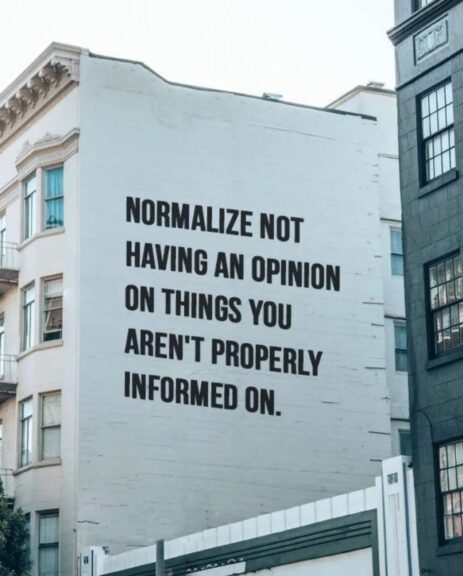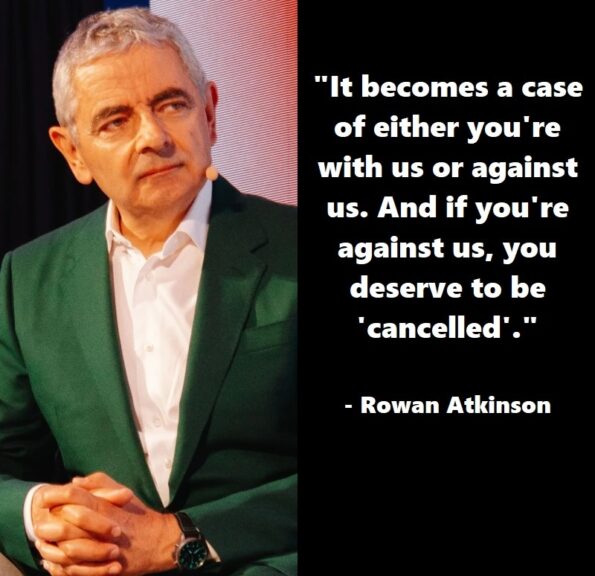There’s a culture war raging for our minds.
It’s the social justice warriors versus the populistic traditionalists. They consume much more than their fair share of the online agenda.
Where does this leave the rest of us?
Where does this leave regular businesses?
Here we go:
The Culture War
According to both sides of today’s polarised landscape, the culture war is a jus bellum justum (a just war) for our moral values.
The just war theory dictates that “[… ] war, while terrible (but less so with the right conduct), is not always the worst option. Important responsibilities, undesirable outcomes, or preventable atrocities may justify war.” 1Just war theory. (2023, November 14). In Wikipedia. https://en.wikipedia.org/wiki/Just_war_theory
However, the culture war is spelling devastating consequences for brands worldwide. Media polarisation. Woke journalism. Populism. De-platforming. Cancel culture. Political correctness.
Businesses are trying to rise to the challenge, but how?
The Publics of the Culture War
We can identify three critical publics in the culture war based on their communicative behaviours.
The two primary publics are active but small…
Social justice warriors (active public). They will not accept any perceived “injustice,” regard themselves as morally superior, and see all opponents as immediate threats to their convictions. According to this public, online aggression is an appropriate political expression (if perpetrated by themselves).
Related reading: Cancel Culture is Evil
Populistic traditionalists (active public). They see “common sense” derived from generations of empirical moral insights to trump all other forms of discernment. They celebrate homogeneity and patriotism and are often religious. According to this public, online aggression is a proper political expression (if perpetrated by themselves).
Related reading: How To Fight Populism
… and the third is inactive but large:
The silent majority (inactive public). They are moderately invested in moral philosophy and more focused on making ends meet in their personal lives. They avoid taking any such aggressive stands — at least publicly. However, they continually “vote” online by clicking, watching, reading, and listening.
Related reading: The Spiral of Silence
How should a brand navigate this culture war?
Either pick a side and stick with it — or steer clear?
Today, organisations must decide whether to hire and fire based on conflicting moral standards. You must look different but not think differently.
Building a team with such moral double standards while simultaneously promoting competent, independent thinkers is impossible.
Learn more: The Culture War
The Media Polarisation Model
We often hear how the media climate is “polarised” — a known and reasonably well-understood effect of classic media logic.
It also seems true that social media logic has amplified the effects of polarisation by grouping people into echo chambers where confirmation bias, conversion theory, and the hostile media effect are allowed to roam freely without any checks and balances.
“Political elites, partisan media, and social media contribute to societal-level political polarization, leading to misperceptions of division among the electorate and fueling animosity and actual ideological polarization over time.”
Source: Current Opinion in Behavioral Sciences 2Wilson, A., Parker, V., & Feinberg, M. (2020). Polarization in the contemporary political and media landscape. Current Opinion in Behavioral Sciences, 34, 223 – 228. … Continue reading
More profoundly, media polarisation is problematic because it draws false lines between extremes that aren’t necessarily perpendicular. These “false lines” will force otherwise balanced media consumers to place themselves between the media-suggested extremes.

At the extremes, sheltered by the social safety of a like-minded peer group (i.e. echo chamber), it’s possible to disregard opposing evidence as “attacks” on their position. As the amplification hypothesis states, any such attacks will only strengthen the position of the extremes.
The harder you attack someone verbally, the more you convince them of their belief, not yours.
The Post-Truth Zone
The amplification hypothesis sustains a post-truth zone at the extremes through media polarisation. If a) the zone is wide enough and b) the extremes are sufficiently close to each other, the forced “balanced” position between them will also result in the post-truth zone.
“Post-truth is a societal phenomenon, influenced by the expectation that honesty is the default position, and the public tolerance of inaccurate and undefended allegations in politics.”
Source: Nature 3Higgins, K. (2016). Post-truth: a guide for the perplexed. Nature, 540, 9 – 9. https://doi.org/10.1038/540009a

Since the forced “balanced” position will have a hard time sheltering anyone from our fear of social isolation, the spiral of silence partially explains why extremes are so effective in silencing the majority of otherwise balanced media consumers. 4Silfwer, J. (2020, June 4). The Spiral of Silence. Doctor Spin | The PR Blog. https://doctorspin.net/spiral-of-silence/
Why Media Polarisation is Disturbing
Like everyone else, I have opinions. However, as a PR professional with 18+ years of experience, I can analyse media issues without siding with any of the extremes.
But no matter how professional my analysis of a current media issue is, I risk blowback from left and right extremes — with no backing from the silent majority.
Many feel compelled by the news media to choose between outlandish extremes — or settle for an equally outlandish middle ground.
Media trends tend to be cyclical, and I estimate that the post-truth era peaked in 2019. My hope, however, is that the pandemic, followed by global inflation and AI progress, will dampen the media’s interest in extreme positions and shrink the width of the post-truth zone.
“Post-truth communication has shaped our understanding of truth, politics, and the media, with its impact on public policy, history, and social media.”
Source: Social Studies of Science 5Sismondo, S. (2017). Post-truth? Social Studies of Science, 47, 3 — 6. https://doi.org/10.1177/0306312717692076
Still, it’s disturbing that the rational business decision for many academics, professionals, and organisations is to strategically steer clear of topics taken “hostage” by left and right extremists — or for organisations to opt for the media blackout tactic.
Normalise Not Having an Opinion
More often than not, in a post-truth society, having no opinion suddenly seems like the only rational escape.

My opinion?
Let’s normalise not having one.
The iron prescription (mental model). Senior advisor Charlie Munger argued: “I have what I call an ‘iron prescription’ that helps me keep sane when I naturally drift toward preferring one ideology over another. I feel that I’m not entitled to have an opinion unless I can state the arguments against my position better than the people who are in opposition. I think that I am qualified to speak only when I’ve reached that state” (Knodell, 2016). 6Knodell, P. A. (2016). All I want to know is where I’m going to die so I’ll never go there: Buffett & Munger – A study in simplicity and uncommon, common sense. PAK Publishing.
Learn more: The Media Polarisation Model
Cancel Culture is Evil
What is cancel culture?
Cancel culture = the weaponisation of social outrage to silence, punish, and exile individuals or ideas rather than engaging with them in rational debate.
Cancel culture thrives on public shaming, digital mob justice, and eliminating nuance, reducing complex human beings to single statements or actions — often taken out of context or judged retroactively by evolving moral standards.
“Cancel culture or call-out culture is a phrase contemporary to the late 2010s and early 2020s used to refer to a form of ostracism in which someone is thrust out of social or professional circles — whether it be online, on social media, or in person. Those subject to this ostracism are said to have been ‘cancelled’.”
Source: Wikipedia 7Cancel culture. (2023, January 4). In Wikipedia. https://en.wikipedia.org/wiki/Cancel_culture
Conformity, Oppression, and Stagnation
Unlike traditional accountability, which allows for discussion, learning, and proportional consequences, cancel culture demands immediate and absolute destruction.
Historically, societies that have embraced ideological purges — whether in the form of book burnings, blacklists, or political witch hunts — have not led to progress but instead to oppression and intellectual stagnation. Cancel culture, while often disguised as activism, is fundamentally a modern form of authoritarian control, ensuring conformity not through reason but through intimidation.
In its most extreme form, cancel culture leads to collective amnesia, erasing people, books, films, and even historical figures from public life, as if uncomfortable realities can be scrubbed from existence.
What makes cancel culture particularly insidious is that it operates outside formal institutions, giving unaccountable digital mobs the power to act as judges, juries, and executioners.
The Terror of Being Next
“Cancel culture on social media is a form of public shaming that aims to diffuse public discourse and promote tolerance, but can also be viewed as a form of intolerance against opposing views.”
Source: Rupkatha Journal on Interdisciplinary Studies in Humanities 8Velasco, J. (2020). You are Cancelled: Virtual Collective Consciousness and the Emergence of Cancel Culture as Ideological Purging. Rupkatha Journal on Interdisciplinary Studies in Humanities, 12. … Continue reading
Cancel culture replaces conversation with coercion, creating a world where moral purity is performative and intellectual exploration is replaced by ideological conformity.
A society ruled by the fear of cancellation is not a free society — it is a social panopticon in which people are not guided by moral conviction but by the terror of being next.
It creates an atmosphere of fear (i.e. the spiral of silence), where people are afraid to express dissenting opinions, ask difficult questions, or challenge prevailing dogmas. This stifles creativity, intellectual diversity, and essential human interaction, as individuals constantly self-censor to avoid social annihilation.

How To Navigate Cancel Culture
The culture war with de-platforming, cancel culture, online lynch mobs, woke journalism, populism, fake news, and moral slacktivism are fast becoming our biggest challenges as PR professionals.
Here’s how to navigate cancel culture:
Learn more: Cancel Culture is Evil

THANKS FOR READING.
Need PR help? Hire me here.

Annotations
| 1 | Just war theory. (2023, November 14). In Wikipedia. https://en.wikipedia.org/wiki/Just_war_theory |
|---|---|
| 2 | Wilson, A., Parker, V., & Feinberg, M. (2020). Polarization in the contemporary political and media landscape. Current Opinion in Behavioral Sciences, 34, 223 – 228. https://doi.org/10.31234/osf.io/yqvzc |
| 3 | Higgins, K. (2016). Post-truth: a guide for the perplexed. Nature, 540, 9 – 9. https://doi.org/10.1038/540009a |
| 4 | Silfwer, J. (2020, June 4). The Spiral of Silence. Doctor Spin | The PR Blog. https://doctorspin.net/spiral-of-silence/ |
| 5 | Sismondo, S. (2017). Post-truth? Social Studies of Science, 47, 3 — 6. https://doi.org/10.1177/0306312717692076 |
| 6 | Knodell, P. A. (2016). All I want to know is where I’m going to die so I’ll never go there: Buffett & Munger – A study in simplicity and uncommon, common sense. PAK Publishing. |
| 7 | Cancel culture. (2023, January 4). In Wikipedia. https://en.wikipedia.org/wiki/Cancel_culture |
| 8 | Velasco, J. (2020). You are Cancelled: Virtual Collective Consciousness and the Emergence of Cancel Culture as Ideological Purging. Rupkatha Journal on Interdisciplinary Studies in Humanities, 12. https://doi.org/10.21659/rupkatha.v12n5.rioc1s21n2 |


